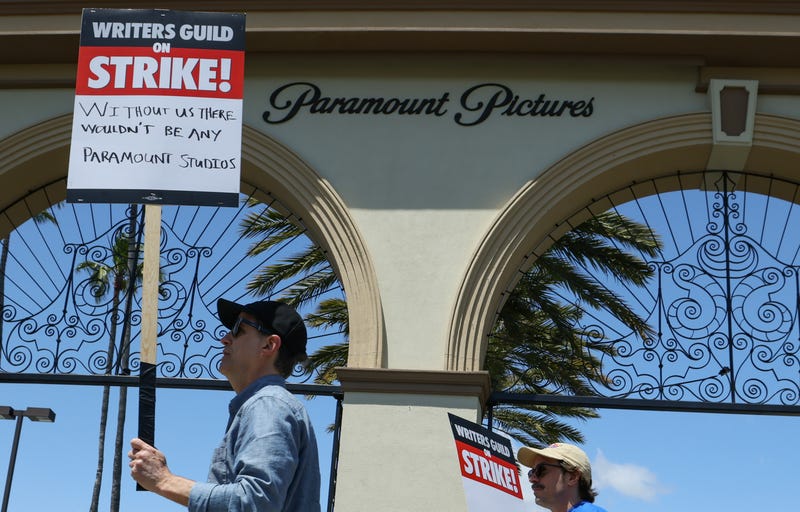
LOS ANGELES (KNX) – On Monday evening, the Writers Guild of America announced an imminent strike, writing that the studios’ responses to their proposal “have been insufficient given the existential crisis writers are facing.”
The Alliance of Motion Pictures and Television Producers, which represents the studios, claimed they “indicated to the WGA that it is prepared to improve that offer, but was unwilling to do so because of the magnitude of other proposals still on the table that the Guild continues to insist upon.”
At the forefront of the writers’ strike are streaming residuals and artificial intelligence. But what exactly was in the guild’s proposal regarding these issues? What did the studios counter and or reject?
Here is a breakdown of some of the key issues at stake in negotiations
Streaming Movies:
*Note: HBSVOD = High-Budget Subscription Video on Demand
What the WGA wanted: Streaming movies with a budget of $12 million or more receive full theatrical terms, including better initial compensation and residuals.
What the studio offered: Writers receive a 9% increase in their compensation for HBSVOD movies that are 96 minutes or over and have a budget of $40 million or more.
Episodic Television:
1.) The Writer’s Room
What that is: where writers create TV scripts
What the WGA wanted:
a.) For pre-greenlight rooms (writers’ rooms where projects have not been given the go-ahead by studios to proceed): A minimum staff with six writers that includes four writer-producers.
b.) Post-greenlight rooms (writers’ rooms where projects were given the go-ahead by studios to proceed): One writer per episode up to 6 episodes and then one additional writer for each two episodes.
Studio response: Rejected with no counteroffer for both.
2.) Employment
What the WGA wanted:
a.) For Pre-greenlight rooms: Minimum staff guaranteed at least 10 consecutive weeks of work
b.) For post-greenlight rooms: On-staff writers get at least three weeks per episode for a maximum of 52 weeks, half of minimum staff must be employed through production and one writer must be employed even while the show is in post-production.
Studio response: Rejected both with no counteroffer.
Lisa Muse Bryant, an executive producer on the show “Primo”, told KNX News writers are being taken advantage of regardless of the size of the writers’ room.
“I’ve been in 23 long-season writers’ rooms and I've been in 10-week mini rooms and you know what the difference is? There is no difference,” she said. “It's just an excuse to pay us less to work us more hours.”
Streaming:
1.) Residuals for foreign streamers:
What the WGA wanted: A new HBSVOD residual agreement based on the streaming service’s foreign subscriber count.
Studio response: A HBSVOD residual agreement based on foreign subscriber count for the largest global streaming services. Paramount+ and HBO Max continue to pay a lower license-fee-based residual.
2.) Viewer-based streaming:
What the WGA wanted: In addition to existing fixed residual, initiate a viewership-based residual to reward programs with greater viewership and require transparency regarding program views.
Studio response: Rejected with no counteroffer.
3.) AD-Supported Free Streaming Services:
*Note: AVOD= Advertising-based Video on Demand
What the WGA wanted: High-budget programs made-for-AVOD get TV weeklies and script fees and improved residuals.
Studio response: Rejected with no counteroffer.
Dominic Patton, senior editor at Deadline, told KNX News that streamers are “one-and-done” for the writers.
“They buy you what you do and they take it,” he said. “You don't really get any information about what your show is doing. So if you're trying to renegotiate going further, you're kind of in a blind spot.”
Artificial Intelligence:
Note: Minimum Basic Agreements (MBA) = “The collective bargaining agreement that covers most of the work done by WGA writers”, according to the WGA.
What the WGA wanted: There must be regulated use of artificial intelligence. AI cannot be used to write or rewrite material nor can it be as source material. Writers’ materials also cannot be used to train AI.
Studio response: Rejected proposal, but did offer annual meetings to discuss advancements in technology.
You can view the guild’s full proposal here.
Follow KNX News 97.1 FM
Twitter | Facebook | Instagram | TikTok


